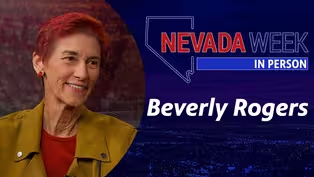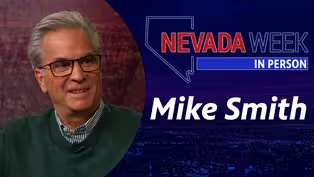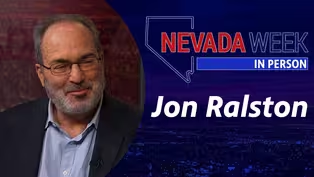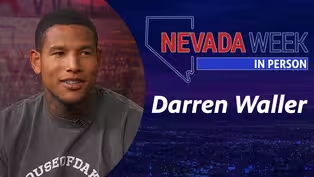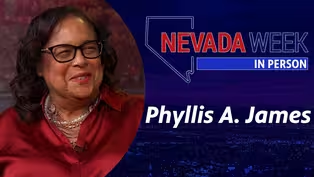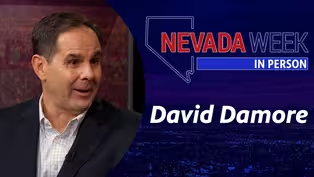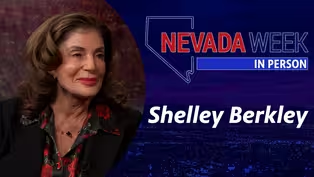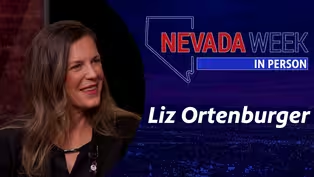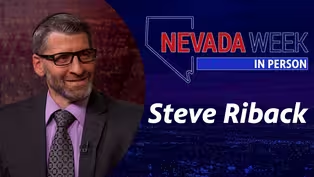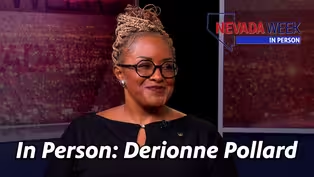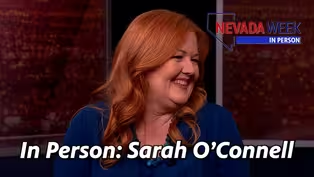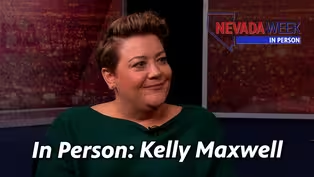
Nevada Week In Person | Andre Wade
Season 1 Episode 38 | 14mVideo has Closed Captions
One-on-one interview with Andre Wade, state director of Silver State Equality.
One-on-one interview with state director of Silver State Equality Andre Wade.
Problems playing video? | Closed Captioning Feedback
Problems playing video? | Closed Captioning Feedback
Nevada Week In Person is a local public television program presented by Vegas PBS

Nevada Week In Person | Andre Wade
Season 1 Episode 38 | 14mVideo has Closed Captions
One-on-one interview with state director of Silver State Equality Andre Wade.
Problems playing video? | Closed Captioning Feedback
How to Watch Nevada Week In Person
Nevada Week In Person is available to stream on pbs.org and the free PBS App, available on iPhone, Apple TV, Android TV, Android smartphones, Amazon Fire TV, Amazon Fire Tablet, Roku, Samsung Smart TV, and Vizio.
Providing Support for PBS.org
Learn Moreabout PBS online sponsorshipMore from This Collection
Nevada Week In Person goes beyond the roundtable discussion of Nevada Week with guests for a more casual conversation about their personal passions, new projects and compelling stories that are overlooked in the flurry of the news cycle.
Nevada Week In Person | Beverly Rogers
Video has Closed Captions
One-on-one interview with Rogers Foundation chair Beverly Rogers. (14m)
Nevada Week In Person | Mike Smith
Video has Closed Captions
One-on-one interview with Las Vegas Sun political cartoonist Mike Smith. (14m)
Nevada Week In Person | Jon Ralston
Video has Closed Captions
One-on-one interview with The Nevada Independent CEO Jon Ralston. (14m)
Nevada Week In Person | Darren Waller
Video has Closed Captions
One-on-one interview with Las Vegas Raider tight end Darren Waller. (14m)
Nevada Week In Person | Phyllis A. James
Video has Closed Captions
One-on-one interview Phyllis A. James. (14m)
Nevada Week In Person | David Damore
Video has Closed Captions
One-on-one interview with Chair of the Department of Political Science at UNLV David Damor (14m)
Nevada Week In Person | Shelley Berkley
Video has Closed Captions
One-on-one interview Senior Vice President for Touro University Shelley Berkley. (14m)
Nevada Week In Person | Liz Ortenburger
Video has Closed Captions
One-on-one interview with SafeNest CEO Liz Ortenburger. (14m)
Nevada Week In Person | Steve Riback
Video has Closed Captions
One-on-one interview with Las Vegas Metro Police Lieutenant Steve Riback. (14m)
Nevada Week In Person | DeRionne Pollard
Video has Closed Captions
One-on-one interview Nevada State College President DeRionne Pollard. (14m)
Nevada Week In Person | Sarah O’Connell
Video has Closed Captions
One-on-one interview with Director of Eat More Art LLC Sarah O’Connell. (14m)
Nevada Week In Person | Kelly Maxwell
Video has Closed Captions
One-on-one interview with Baby’s Bounty Executive Director Kelly Maxwell. (14m)
Providing Support for PBS.org
Learn Moreabout PBS online sponsorshipHe leads the way in letting Nevada's lawmakers know what's on the minds of the state's LGBTQ community.
Andre Wade, State Director of Silver State Equality joins us this week for Nevada Week In Person.
♪♪♪ Support for Nevada Week In Person is provided by Senator William H. Hernstadt and additional supporting sponsors.
Welcome to Nevada Week In Person.
I'm Amber Renee Dixon.
Helping others is how he described the theme of his career path for the past 25 years.
That path included work in areas like foster care, youth homelessness, and currently the LGBTQ community.
Andre Wade, thank you for joining us for Nevada Week In Person.
-It's my pleasure.
-So Silver State Equality has an advocacy arm to it, but you do other work as well.
What does that include?
-So Silver State Equality is Nevada's statewide LGBTQ+ civil rights organization.
Our mission is to bring the voices of LGBTQ+ people to the institutions of power to create a world that is healthy, just, and fully equal with the idea that when people are in trouble or in need, they turn to institutions for support.
So we do that by passing pro-equality legislation here in Nevada and also in D.C.--We have a national policy director out in DC-- and getting pro-equality candidates elected to office; and then our advocacy and public education around many issues.
Currently, we're doing a lot in the public health arena, but-- and our student advisory council that we're getting off the ground.
So we do quite a bit of things to create a world that is healthy, just, and fully equal.
-I do want to bring that up because August 19th, we had you on to talk about some COVID listening sessions that you had held within the community, how they will inform your outreach for monkeypox, and then the student advisory council, which I believe came out of COVID.
How so?
-So in the midst of the pandemic, when people were at home, we started to hear the high rates of either suicide attempts or completions by young people, regardless of their sexual orientation and gender identity.
But we know that LGBTQ young people struggle even more so than their straight and cisgender peers.
And so our advisory council wanted to do something to address the needs of students.
And so through some research, we came up with this idea of creating a student advisory council that would give students an opportunity to participate virtually to identify changes that they want in the schools and to also come up with a presentation that they'll do to law makers and decision makers to hopefully make change.
And so it's a way to get them engaged, involved, and to hopefully address any sort of mental health concerns due to isolation.
-Monkeypox.
Why is that on your radar right now?
How big of an issue is it?
-Monkeypox is on our radar because, unfortunately, it is disproportionately affecting gay, bisexual, and men who have sex with men, and those who are Black and Hispanic.
And so we have to do what we need to do to address this situation by increasing vaccine readiness and availability but also getting information out to people about what monkeypox is and symptoms to look out for.
So we have a lot on our hands to address, unfortunately, another public health concern.
-How big is the worry that, similar to AIDS in the 80s, monkeypox is going to be used as anti-LGBTQ rhetoric?
-Even though that happens, I think it's really interesting in 2022 that people are, from the jump, addressing it.
And so you have people who are making decisions in the public health sphere that are mindful of not being-- not using stigmatizing language, which is great.
And so whenever we see it, we can address it quicker.
And so that's a positive.
And so regardless of any rhetoric that happens, we're actually able to address it sooner rather than later.
But I think, more importantly, we just got to get the information out to folks, despite the rhetoric that's going on out there.
-Any priorities for next year's legislative session here in Nevada?
-Yeah.
We have our priorities set.
One of them is going to be addressing HIV modernization again.
Even though we passed a comprehensive bill, we want to make sure that there aren't any unintended consequences from the bill that passed.
And so far, we're not learning anything.
And so with-- -Tell me about the bill.
-So, yeah, the Governor's task force helped to create the bill that was passed.
And what it does is modernize the laws related to HIV criminalization.
And so you used to be able to have a felony enhancement if you were thought to have transmitted HIV intentionally or unintentionally.
And so this felony enhancement was a big concern because out of all the communicable diseases, HIV was the only one where it was a felony enhancement, which is related to stigma, homophobia, from the 1980s and 90s and misinformation.
So a lot has changed about what we know about HIV and its treatment.
And so we needed our laws to change to reflect that.
-Felony enhancement, meaning it would be a felony-- -Yes.
- --if you knowingly infected someone else with-- -Yes.
- --HIV?
-There are other communicable diseases that may be more harmful if transmitted intentionally or unintentionally, but HIV was the only one, regardless of these other communicable diseases and their transmissibility, that was a felony enhancement.
And so that's stigmatizing.
And we had to address that.
-How much was that being used?
How much was that coming up in court cases?
How hard would that be to prove that someone intentionally did that?
-Well, the laws have language where there's loopholes.
And so if we had laws that said, "intentionally transmitted," like, what does that mean?
So back in the 1980s and 90s, we thought that perhaps biting, scratching, spitting was a way to transmit HIV, which is not the case at all.
And so if you back up and realize that that's not really how things work, like how can we get our laws to reflect that?
And so even if you are living with HIV but your viral loads are low, you still can't transmit HIV.
But if you're living with HIV, then is that in and of itself a reason to have someone have felony enhancement, even though, scientifically, they can't transmit it?
So these sorts of things needed to be addressed, which we did.
And so now our laws are in alignment with science and modern medicine.
-And you were appointed to that task force by the Governor two different times.
Speaking of the Nevada Legislature-- not in session right now, but will be next year.
Across the country, though, there are several legislators this year who have passed antigay legislation.
Talking about Florida, for example, K through 3 you cannot talk about sexual identity.
Further-- It goes further than that, gender identification.
It's the "Don't Say Gay" bill I think it's commonly known as.
How does that impact Nevadans when you're having that across the country?
-So I want to start off by saying that there aren't really conversations happening in K through 3rd grade about someone's sexual orientation and gender identity.
There's this thought that we are talking about that, or teachers are talking about that, but then they also attach it to sex ed.
So, unfortunately, when people talk about the LGBTQ communities, sex ed automatically comes up.
And that's not the case.
And so when people hear this misinformation in the national media and in political conversations, it has a negative effect on people's self esteem and their well being, especially for young people.
And so we already know, based on research, that when young people hear about LGBTQ issues in the media, especially in a negative light, that has a negative impact on them and their self esteem.
And so young people are struggling as there's these national conversations being had telling them that they are bad people.
And now you have bills that are coming out of-- and policies coming out of like Texas where parents could be impacted by trying to care for their transgender child.
Like we spent decades trying to get people to treat their children better if they are from the LGBTQ community.
And we're doing rather well, and parents are responding.
But now people are at threat of having Child Welfare involved in their lives, simply because they want to take care of their children.
And so it's really damaging and confusing to anyone but, in particularly, young people.
-Are you aware of any movement like that in Nevada?
-We are not aware of any movement.
We were gonna shut that down if there was any movement.
You know, I will say that Nevada has been said to be one of the best places for LGBTQ+ people to live because of the laws that we have in place thanks to folks like Senator David Parks and Senator Pat Spearman and Senator Dallas Harris and Melanie Scheibel.
And I say that because they've really led the way to have these really pro-equality laws in place that have protections for us, which is important.
But there's still a lot that happens in the rural areas that we need to be concerned about, because people are still living in silence and in fear simply because of who they are.
-Do you agree with the idea that Nevada is LGBTQ friendly?
-I do.
I do.
Now, that doesn't mean it's going to translate all the time on the ground; that you're not going to have any hiccups or issues.
But I am proud to be a Nevadan, born and raised, and to be able to do this work and then look at my colleagues doing similar work in other states and know that we are really quite innovative in our laws.
And people wouldn't necessarily think that for Nevada.
So I'm really super proud of that and encourage people to come to Nevada and experience the greatness that we have here.
-How does Nevada now compare to when you came out?
-Very different.
So I was in high school to college when even the LGBTQ Center of Southern Nevada started in 93.
And there was a really big push to address homophobia and children running away from home because of who they are.
And even back then I didn't come out until much later, because things were just different.
The environment was different.
And so over the past 20 years, the movement has really done a great job in implementing practices to teach people what it really means to be from the LGBTQ community.
We have our social safety networks in place within our own community when the other mainstream organizations aren't going to care for us.
And so we're doing what our forefathers and mothers and ancestors have done to make the world a better place.
And so I'm just taking the baton and doing what I can to make it better for young people today.
-Twenty-five years ago is when you say you started this career path of helping others.
Was there a specific moment that led you to think this is what I'm gonna do with my time?
-Yeah, there were several moments.
So, you know, growing up and being different.
When I was in elementary school and junior high, I didn't think I was gay.
But other people did.
And as a result, I was bullied and ostracized and isolated.
And it really had an effect on me from a social standpoint and even the self esteem.
And I just remember having conversations with myself as a teenager that I wanted to help people because I didn't want people to go through what I went through.
I didn't want-- I didn't feel I had anyone to turn to.
So I wanted to be someone that people could turn to.
So I set on this path to have this career that's just evolved in many different ways.
But the underlining thing is just that I want to help people.
I want to make things better.
So anything I can do to play a part in that, knowing what I've went through and knowing what other people have gone through, that's just my driving force.
-And you started out with adoption and foster care within Clark County, also working in youth homelessness.
Takeaways from any of those experiences?
-I'll take it back a little further.
I really kind of got things started, working in a group home out in L.A. with what we called severely emotionally disturbed young people.
When I worked with families who had children with developmental disabilities, I learned a lot about how families respond to crises, if you will.
But working in child welfare, you learn that it's a system that you wish didn't exist, because their system doesn't respond well to black and brown families and LGBTQ children and families.
And so when you see this, you realize, like, there's work that needs to be done.
And sometimes you're one of very few or the only person who's like, hey, something needs to change here.
And so you just learn that, although there's a lot to do, there's some opportunities out there.
But, unfortunately, systems are hard to change overnight.
-Was that why you got out of it?
-I got out of it because my career and my interests evolve over time, and the opportunities evolve over time.
And so I had the opportunity to work at the LGBTQ Center of Southern Nevada to be the Director of Operations there, and I saw that as a great way to use my skills with program development and program management to try to build up some programs for our community, which we did a really great job.
And so just really proud of that work back then.
-Andre Wade, we have run out of time.
Thank you so much for joining us on Nevada Week In Person, and to see this week's edition of Nevada Week, tune in Sunday at 5:30.

- News and Public Affairs

Top journalists deliver compelling original analysis of the hour's headlines.

- News and Public Affairs

FRONTLINE is investigative journalism that questions, explains and changes our world.












Support for PBS provided by:
Nevada Week In Person is a local public television program presented by Vegas PBS
